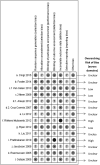The use of mobile applications to support self-management for people with asthma: a systematic review of controlled studies to identify features associated with clinical effectiveness and adherence
- PMID: 27694279
- PMCID: PMC7651908
- DOI: 10.1093/jamia/ocw143
The use of mobile applications to support self-management for people with asthma: a systematic review of controlled studies to identify features associated with clinical effectiveness and adherence
Abstract
Objectives: Telehealth is promoted as a strategy to support self-management of long-term conditions. The aim of this systematic review is to identify which information and communication technology features implemented in mobile apps to support asthma self-management are associated with adoption, adherence to usage, and clinical effectiveness.
Methods: We systematically searched 9 databases, scanned reference lists, and undertook manual searches (January 2000 to April 2016). We include randomized controlled trials (RCTs) and quasiexperimental studies with adults. All eligible papers were assessed for quality, and we extracted data on the features included, health-related outcomes (asthma control, exacerbation rate), process/intermediate outcomes (adherence to monitoring or treatment, self-efficacy), and level of adoption of and adherence to use of technology. Meta-analysis and narrative synthesis were used.
Results: We included 12 RCTs employing a range of technologies. A meta-analysis (n = 3) showed improved asthma control (mean difference -0.25 [95% CI, -0.37 to -0.12]). Included studies incorporated 10 features grouped into 7 categories (education, monitoring/electronic diary, action plans, medication reminders/prompts, facilitating professional support, raising patient awareness of asthma control, and decision support for professionals). The most successful interventions included multiple features, but effects on health-related outcomes were inconsistent. No studies explicitly reported adoption of and adherence to the technology system.
Conclusion: Meta-analysis of data from 3 trials showed improved asthma control, though overall the clinical effectiveness of apps, typically incorporating multiple features, varied. Further studies are needed to identify the features that are associated with adoption of and adherence to use of the mobile app and those that improve health outcomes.
Keywords: asthma; medical informatics; mobile application; self-management; telemedicine.
© The Author 2016. Published by Oxford University Press on behalf of the American Medical Informatics Association. All rights reserved. For Permissions, please email: journals.permissions@oup.com
Figures
References
-
- World Health Organization. Facts About Asthma. Updated November 2013. http://www.who.int/mediacentre/factsheets/fs307/en/. Accessed September 13, 2016.
-
- British Thoracic Society, Scottish Intercollegiate Guideline Network. A National Clinical Guideline: The British Guideline on the Management of Asthma. Revised 2014. http://www.sign.ac.uk/guidelines/fulltext/141/index.html. Accessed September 13, 2016.
-
- Levy ML, Andrews R, Buckingham R et al. . Royal College of Physicians. Why asthma still kills: the National Review of Asthma Deaths (NRAD) Confidential Enquiry Report London: RCP. 2014. https://www.rcplondon.ac.uk/sites/default/files/why-asthma-still-kills-f.... Accessed September 13, 2016.
-
- Taylor SJC, Pinnock H, Epiphaniou E et al. . A rapid synthesis of the evidence on interventions supporting self-management for people with long-term conditions. Health Serv Deliv Res. 2014;2:54. - PubMed
-
- Gibson PG, Powell H, Coughlan J et al. . Self-management education and regular practitioner review for adults with asthma. Cochrane Database Syst Rev. 2003;(1):CD001117. - PubMed
Publication types
MeSH terms
Grants and funding
LinkOut - more resources
Full Text Sources
Other Literature Sources
Medical
Miscellaneous






